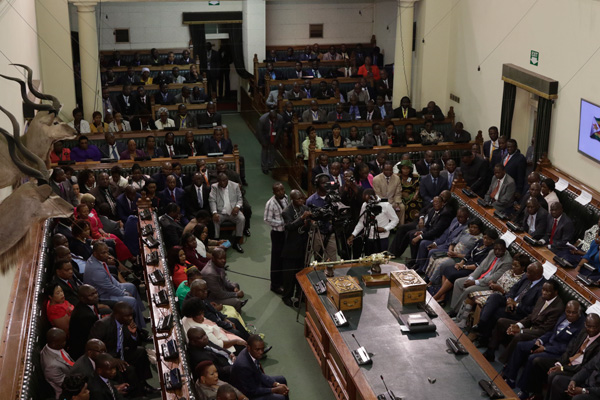
FOUR years after the Fourth Session of the Eighth Parliament resumed in 2013, only 35 MPs out of 350 have been actively contributing to debates in Parliament.
BY VENERANDA LANGA
This came out in a recent research by a women empowerment non-governmental organisation, the Women in Politics Support Unit (Wipsu).
Sakhile Sifelani, the Wipsu director told journalists at a gender workshop for the Zimbabwe Parliamentary Journalists Forum in Harare that, in their research, they found 52 MPs are mum and not contributing at all to debate in Senate and the National Assembly.
She said some MPs have not been vocal during debate in the Houses of Parliament, although they have made contributions during sittings of Parliamentary Portfolio and Thematic Committees, which are not recorded in the Parliament records of debates, the Hansard.
“Parliament has 350 MPs and as at December 2016, 125 of those are women, which constitutes 34%, and which is the highest number ever of female MPs,” Sifelani said.
“As at March 2017, since the beginning of the Eighth Session of Parliament, a cohort of 35 MPs have been speaking actively in both Houses of Parliament, while 52 MPs have not said anything, and this constitutes both men and women.”
Pertaining to ministers, Sifelani said males have been dominating in Parliament, given that of the 30 ministers in the country, only eight are women, while there are only two women out of the 22 deputy ministers appointed.
- Chamisa under fire over US$120K donation
- Mavhunga puts DeMbare into Chibuku quarterfinals
- Pension funds bet on Cabora Bassa oilfields
- Councils defy govt fire tender directive
Keep Reading
This gender anomaly, Sifelani explained, had the effect of portraying a picture that males were more vocal in Parliament than females.
“The reason why 35 MPs have been very vocal and often covered by the media is that some are seasoned politicians, who have served in Parliament for more than two terms,” she said.
“They already have skills and the capacity to debate on any motion and Bills brought before Parliament. Some have leadership roles, for example, they chair committees and this gives them a chance to present reports in Parliament and get recorded as active participants.”
Sifelani said after the live coverage of Parliamentary debates, her organisation began to record more active participation during question and answer sessions by both male and female MPs.
Gender Media Connect national director, Abigail Gamanya urged journalists to amplify the female legislators’ voice in their stories to instil confidence in female politicians.
Veteran journalist, Chis Chinaka said parliamentary reporters must understand the structure of the legislature, where males constitute the largest number of MPs, and ensure to include the gender dimension in their reports.
Meanwhile, opposition MPs last week asked the Speaker of the National Assembly Jacob Mudenda to set up a privileges committee to charge truant ministers that have not been attending Parliament.
MDC-T chief whip, Innocent Gonese said some ministers were perennially absent from question and answer sessions, adding it is high time Parliament shows that its teeth can bite and begin summoning ministers to appear before the privileges committee to explain their truancy.
“The time has now come for Parliament to show its teeth and mechanisms must now be put in place to punish the truant ministers,” he said.
“I suggest that a privileges committee be set up in terms of which all truant ministers that have not been seeking leave of absence can be given an opportunity to appear before the privileges committee so that they explain their issues of absence, especially Foreign Affairs minister Simbarashe Mumbengegwi.”
But Mudenda defended Mumbengegwi, saying he travelled a lot, hence, his irregular appearance in Parliament.
“I think we cannot start by constituting a privileges committee now. We need to first do an administrative audit and identify those ministers that are truant first,” Mudenda said.











